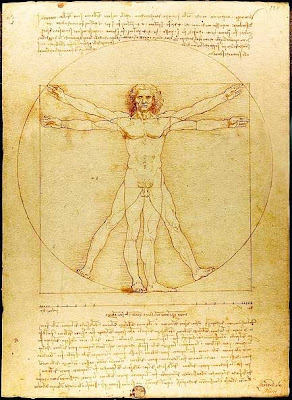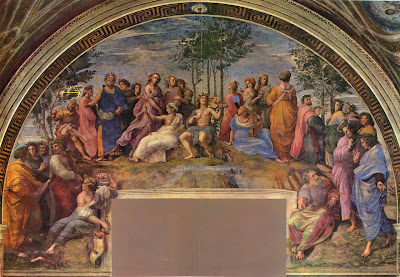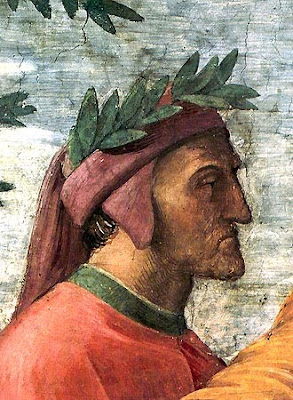1 Euro, 2002
 Are you thinking that you have seen this figure umpteen times, but do not know what it is? This is the famous sketch of Vitruvian man by the Italian artist Leonardo Da Vinci. The drawing illustrates Da Vinci's representation of the ideal proportions of the human body, as it was postulated by the Roman architect Marcus Vitruvius in 1BC, and after whom this sketch is so named. Although Da Vinci could not give any scientific assertion as to why the ideal proportions of the human body should be as shown, but a number of artistes from generations following him have given their postulates regarding this sketch. In this sketch, the navel is taken as the centre of our body and a circle is drawn from there, with the radius extending from the navel to the tip of the feet. We also notice a square drawn with the length of its side from the feet to the head, and just enclosing the extended arms.
Are you thinking that you have seen this figure umpteen times, but do not know what it is? This is the famous sketch of Vitruvian man by the Italian artist Leonardo Da Vinci. The drawing illustrates Da Vinci's representation of the ideal proportions of the human body, as it was postulated by the Roman architect Marcus Vitruvius in 1BC, and after whom this sketch is so named. Although Da Vinci could not give any scientific assertion as to why the ideal proportions of the human body should be as shown, but a number of artistes from generations following him have given their postulates regarding this sketch. In this sketch, the navel is taken as the centre of our body and a circle is drawn from there, with the radius extending from the navel to the tip of the feet. We also notice a square drawn with the length of its side from the feet to the head, and just enclosing the extended arms.
The Vitruvian man by Leonardo Da Vinci

Parnassus by Raphael
 Dante is shown by the yellow arrow. The center figure is Apollo and the mural shows nine muses, nine poets from eras past and nine contemporary poets including Dante Alighieri.
Dante is shown by the yellow arrow. The center figure is Apollo and the mural shows nine muses, nine poets from eras past and nine contemporary poets including Dante Alighieri.
2 Euro, 2002
 The Italy 2 Euro coin shows the face of Dante Alighieri, as it was frescoed posthumously by the celebrated Italian painter Raphael in his painting titled 'Parnassus'. This fresco was painted as a mural or a painting on a wall to decorate the walls of the Apolistic palace in the Vatican. The painting shows the mythical mount Parnassus where Apollo resides. Apollo is surrounded by nine muses, nine poets of ages past and nine contemporary poets. Dante Alighieri is known for his work 'The Divine Comedy'. The movie Dante's inferno is based on the first part of the epic known as 'The Divine Comedy'. Inferno here refers to hell and Dante's Inferno allegorically tracks the journey of Dante through what is the medieval concept of hell.
The Italy 2 Euro coin shows the face of Dante Alighieri, as it was frescoed posthumously by the celebrated Italian painter Raphael in his painting titled 'Parnassus'. This fresco was painted as a mural or a painting on a wall to decorate the walls of the Apolistic palace in the Vatican. The painting shows the mythical mount Parnassus where Apollo resides. Apollo is surrounded by nine muses, nine poets of ages past and nine contemporary poets. Dante Alighieri is known for his work 'The Divine Comedy'. The movie Dante's inferno is based on the first part of the epic known as 'The Divine Comedy'. Inferno here refers to hell and Dante's Inferno allegorically tracks the journey of Dante through what is the medieval concept of hell.
Dante in 'Parnassus'



No comments:
Post a Comment